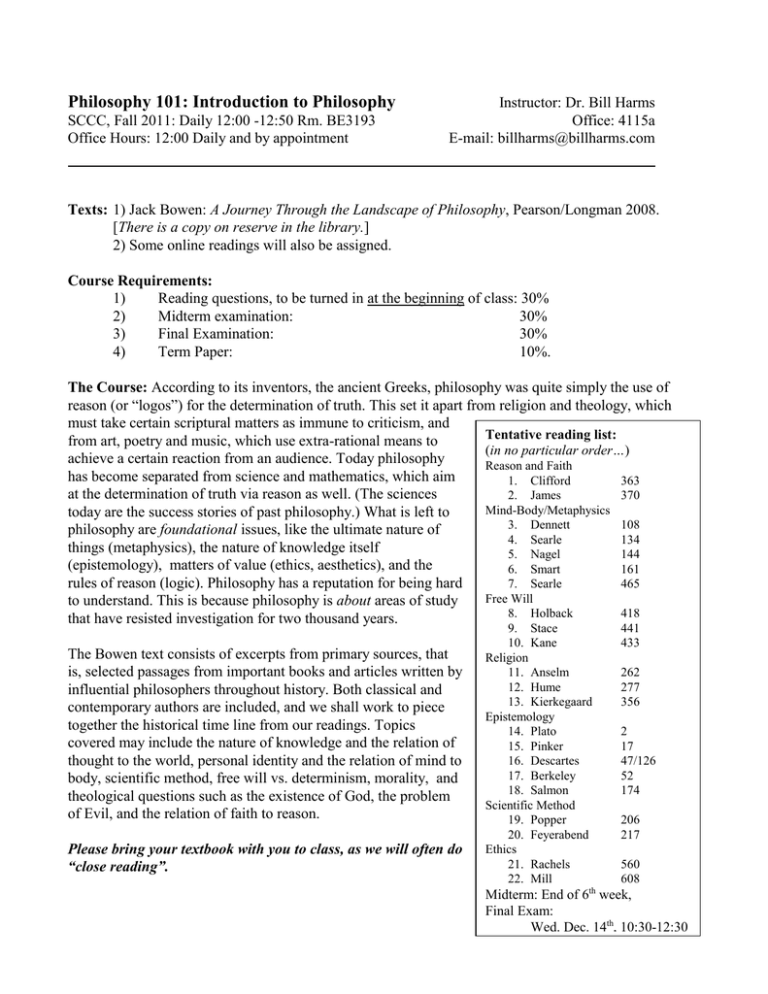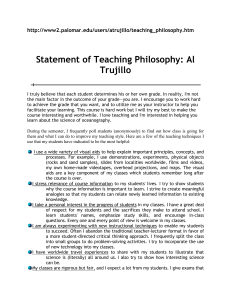
Philosophy 101: Introduction to Philosophy
SCCC, Fall 2011: Daily 12:00 -12:50 Rm. BE3193
Office Hours: 12:00 Daily and by appointment
Instructor: Dr. Bill Harms
Office: 4115a
E-mail: billharms@billharms.com
Texts: 1) Jack Bowen: A Journey Through the Landscape of Philosophy, Pearson/Longman 2008.
[There is a copy on reserve in the library.]
2) Some online readings will also be assigned.
Course Requirements:
1)
Reading questions, to be turned in at the beginning of class: 30%
2)
Midterm examination:
30%
3)
Final Examination:
30%
4)
Term Paper:
10%.
The Course: According to its inventors, the ancient Greeks, philosophy was quite simply the use of
reason (or “logos”) for the determination of truth. This set it apart from religion and theology, which
must take certain scriptural matters as immune to criticism, and
Tentative reading list:
from art, poetry and music, which use extra-rational means to
(in no particular order…)
achieve a certain reaction from an audience. Today philosophy
Reason and Faith
has become separated from science and mathematics, which aim
1. Clifford
363
at the determination of truth via reason as well. (The sciences
2. James
370
Mind-Body/Metaphysics
today are the success stories of past philosophy.) What is left to
3. Dennett
108
philosophy are foundational issues, like the ultimate nature of
4. Searle
134
things (metaphysics), the nature of knowledge itself
5. Nagel
144
(epistemology), matters of value (ethics, aesthetics), and the
6. Smart
161
rules of reason (logic). Philosophy has a reputation for being hard
7. Searle
465
Free Will
to understand. This is because philosophy is about areas of study
8. Holback
418
that have resisted investigation for two thousand years.
The Bowen text consists of excerpts from primary sources, that
is, selected passages from important books and articles written by
influential philosophers throughout history. Both classical and
contemporary authors are included, and we shall work to piece
together the historical time line from our readings. Topics
covered may include the nature of knowledge and the relation of
thought to the world, personal identity and the relation of mind to
body, scientific method, free will vs. determinism, morality, and
theological questions such as the existence of God, the problem
of Evil, and the relation of faith to reason.
Please bring your textbook with you to class, as we will often do
“close reading”.
9. Stace
10. Kane
Religion
11. Anselm
12. Hume
13. Kierkegaard
Epistemology
14. Plato
15. Pinker
16. Descartes
17. Berkeley
18. Salmon
Scientific Method
19. Popper
20. Feyerabend
Ethics
21. Rachels
22. Mill
441
433
262
277
356
2
17
47/126
52
174
206
217
560
608
Midterm: End of 6th week,
Final Exam:
Wed. Dec. 14th, 10:30-12:30
The Requirements:
Of course, there has to be some way of motivating you to study and measuring your progress, so we have
the course requirements:
Exams
The three equally weighted exams are intended to be straightforward. (The material is tricky enough!)
The Final Exam is not cumulative, but may include a few questions from earlier in the course. The best
way to prepare for the exams is to make sure you understand the material as it occurs in lecture. There
will be a review session for each exam, and a list of all possible questions will be provided ahead of
time.
Homework
1. Homework consists of answering reading questions while you read the texts before the lectures. often,
I will just ask you to outline the argument in the reading. In other cases I will assign a particular question
or questions. Homework is due at the beginning of class (unless it is typed).
2. Assigned homework questions may appear on the exams.
3. Think of the homework as a sort of journal of your reading. Feel free to put comments in about your
reaction to the readings. Homework will not be corrected by me, but simply be marked for being done.
You are responsible for making sure that your answers are correct. If the answers are not clear from the
lecture and discussion, ASK QUESTIONS!!!
The term paper will be a substantial (8-10 page) paper analyzing a particular argument. This is not an
opportunity for you to “philosophize”, but to see whether you can explain and criticize some
philosopher’s argument. This is most like a “pro-con” paper, though the emphasis is on testing the
defensibility of a single argument. It is also possible to write a dialog. A topic proposal will be due four
weeks before the end of the quarter. A rough draft of at least five pages will be due two weeks later,
followed by a consultation and rewrite. Detailed instructions will be given later.
*If you need course adaptations or accommodation because of a disability, if you have emergency
medical information to share with your instructor, or if you need special arrangements in case the
building must be evacuated, please make an appointment with your instructor as soon as possible.





